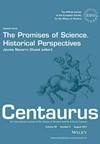医疗记忆。医学中的过去的收集和回忆
IF 0.5
1区 哲学
Q3 HISTORY & PHILOSOPHY OF SCIENCE
引用次数: 2
摘要
本文章由计算机程序翻译,如有差异,请以英文原文为准。
Medical Anamnesis. Collecting and Recollecting the Past in Medicine
This paper suggests that the practice of anamnesis— the taking of a patient history in preparation for making a diagnosis, as well as the related form of investigation, historia — offers a way to understand the role of medical collections in generating medical knowledge. Anamnesis derives from ancient Greek “recollecting” or “opening of memory,” and “taking a history” from historia , an ancient and early modern epistemic practice of gathering empirical observations from the past and present. Doctors and medical researchers perform, this paper argues, a form of anamnesis when they access collections—of pathological organs, experimental animals, diagnostic slides, samples, and data—and the collections may in turn be seen as constituting institutional and disciplinary memories. It moreover shows that doctors and medical researchers in their work with collections negotiate two ways of organizing observations that are also present in an anamnesis. One way clusters and classifies observations, while the other traces developments and requires significant past observations to understand the present. This double nature plays out in different ways in different historical collections. Last, the paper itself may also be seen as performing an
求助全文
通过发布文献求助,成功后即可免费获取论文全文。
去求助
来源期刊

Centaurus
HISTORY & PHILOSOPHY OF SCIENCE-
CiteScore
3.10
自引率
25.00%
发文量
52
审稿时长
>12 weeks
期刊介绍:
Centaurus publishes an international spectrum of original research papers, historiographical articles, and other academic content on the history of science in the broadest sense, including mathematics, medicine, biomedical sciences, earth sciences, social sciences, humanities and technology, and their social and cultural aspects. We also invite contributions that build a bridge between history of science and other disciplines. Book notices, book reviews and essay reviews of publications within the journal''s scope are commissioned to experts. The Editor encourages suggestions for special issues, short papers on topics of current interest and articles suited to open peer commentary along with a list of potential commentators.
 求助内容:
求助内容: 应助结果提醒方式:
应助结果提醒方式:


